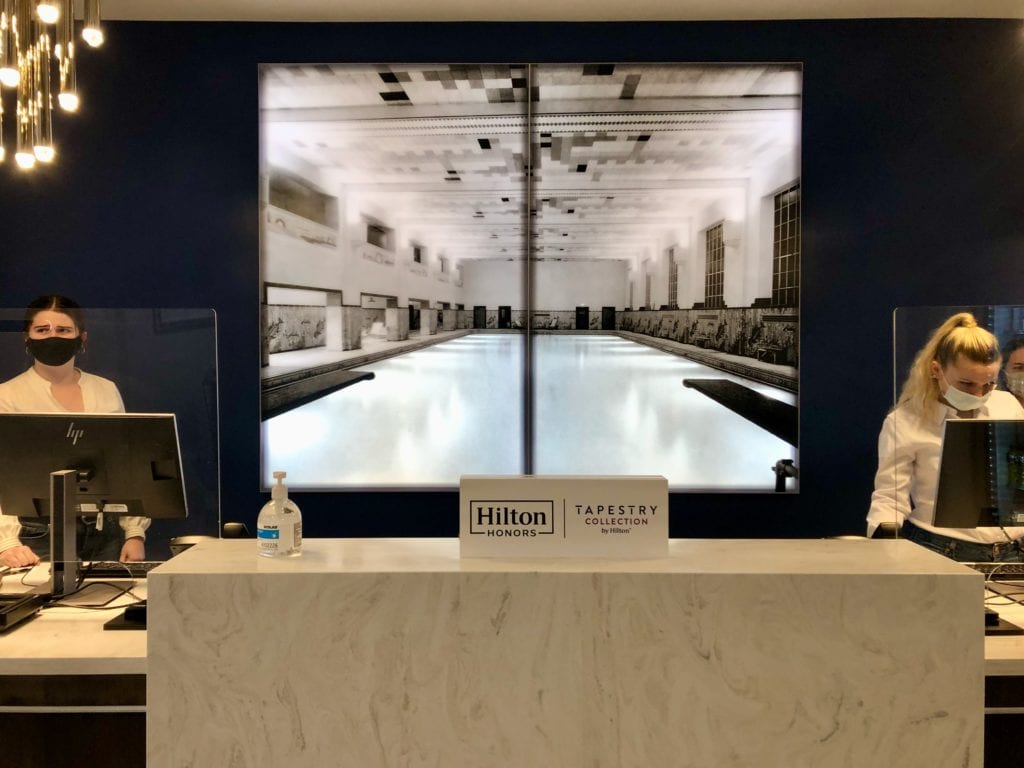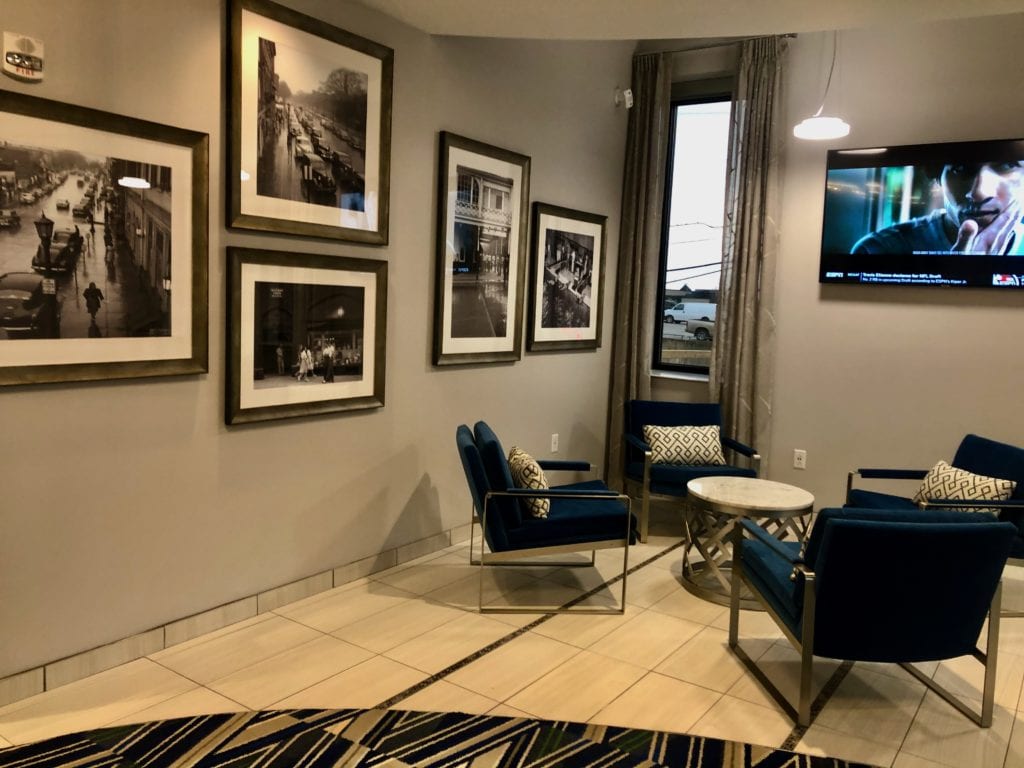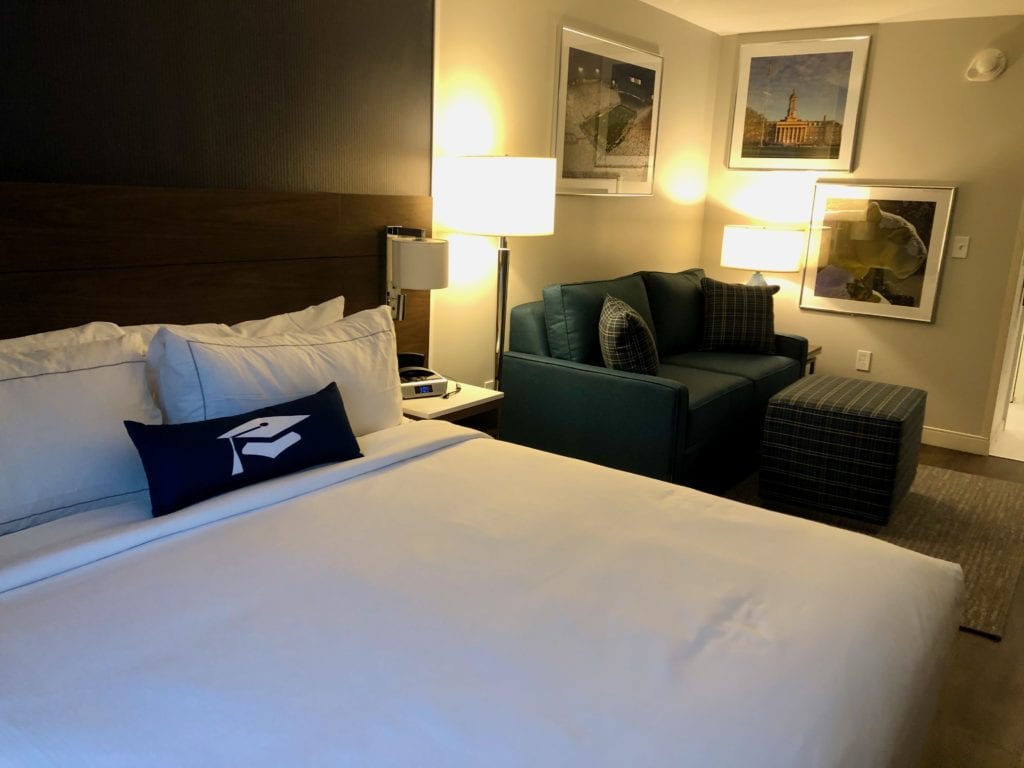New Hotel Opens in Glennland Building
By: fioreMarketing | January 15, 2021 | Original Article
Downtown State College’s newest hotel opened its doors on Friday, bringing new life to a historic building while paying tribute to its past and the local community.
Scholar Hotel State College began welcoming guests after nearly a year and a half of interior renovations to the Glennland Building, 205 E. Beaver Ave.
“When you have a historic building like this, you can’t really touch the outside of it because you’ve got to maintain the historic nature of the building,” Gary Brandeis, president of Scholar Hotel Group and a 1988 Penn State graduate, said. “But we’ve really sort of rebuilt the whole interior of the building. When you come in you get a sense of the history of the building, but it’s also new and modern as well.”
From the lobby to each of the 72 guest rooms, most of which are designed with extended stays in mind, there are nods to State College past and present and the Glennland itself.
Constructed in 1933 by builder O.W. Houts and physician Dr. Grover Glenn, the Glennland Building is listed in the National Register of Historic Places. For 40 years, it was the tallest building in State College and was home to the area’s first public elevator and first indoor swimming pool.

The swimming pool, which closed in 1967, is memorialized behind the front desk, with a lithograph that was enlarged and backlit. Elsewhere, visitors will find photos of State College in the 1930s and 1940s as well as a collage of fraternity formal photos from the 1980s.
Each of the guest rooms features photos of Penn State and the State College community as well.
“We really tried to capture State College and the Penn State community with the colors, the artwork,” Brandeis said.

Scholar Hotel Group also owns the Hyatt Place in the Fraser Centre, as well as well as Scholar Hotels in two other university towns: Syracuse, New York, and Morgantown, West Virginia. When the company purchased the Glennland in April 2019, Brandeis said they knew they didn’t want to make it “a regular hotel.”
Looking at the local market, they found just one major player in the extended-stay business, Residence Inn on South Atherton Street, and its business was booming.
“We said ‘What if we take that concept and bring it downtown?” Brandeis said. “I think it would do even better. People want to be downtown. They want to be able to walk to campus. They want to be able to walk to the bars and restaurants and shops.”
Brandeis said 16 guests were checking in on Friday, many of them Penn State students who would be staying at the hotel for the spring semester.
Of the 72 rooms, 56 are equipped with kitchens. An efficiency suite has a double burner stovetop, refrigerator and dishwasher, along with a seating area, pull-out desk and extensive closet space. One-bedroom suites have a living room including a large couch with pullout bed and 55-inch TV, as well as a work area, dining table and a kitchen with a full oven, refrigerator, dishwasher and sink.
The other 16 rooms are designed for more traditional overnight stays and do not have kitchens, but each has a connecting door to a one-bedroom suite that can be unlocked for guests who want a two-bedroom, two-bath suite.

On the first floor of the hotel is a 1,250 conference and meeting space, 24-hour fitness center and 24-hour business center with printing services.
Social Food + Drink, a bistro and full-service bar, is expected to open on the first floor of the hotel on April 1. It will serve breakfast, lunch and dinner and will be open to the public, with its own entrance along Beaver Avenue.
The hotel is part of Hilton’s Tapestry Collection, which Brandeis described as a “soft brand.”
“It allows us to call it the Scholar and design it the way we want, but we’re still part of Hilton,” he said. “You can use Hilton points to stay here and if you stay here you earn Hilton points.”
Protecting the historic building — which most recently had been largely student apartments — while also giving it new life and purpose were key for Brandeis and his team.
The Campbell family, which had owned the building for generations, said in 2017 that despite pouring significant investments into the building, the cost of preventing further deterioration was prohibitive, leading them to look for a buyer.
While preserving the exterior, Scholar Hotel Group rebuilt the interior, adding new heating and cooling, electrical and fire alarm and sprinkler systems. Some unstable floors and even some structural steel needed to be replaced, Brandeis said.
“There was quite a few surprises,” he said. “Not shocking, but certainly things you have to deal with when you buy a historic building.”

Construction began in September 2019 with plans to open Labor Day weekend 2020, just in time for the start of Penn State football and the university’s fall semester. Then the COVID-19 pandemic hit, pushing things back another four and a half months.
As a Penn State alum who has maintained close ties with the State College community, Brandeis said he is proud that his company could preserve the building and also “reimagine” what it could be.
“For us to be able to acquire the building, redevelop it into this product, and, hopefully, the community embraces it, we get customers and people like it, that’s the real honor,” he said. “As a Penn State grad and someone who spends a ton of time here, it’s a real honor to have the opportunity to do this. We’re thrilled with the result. Now we just have to get through the pandemic and wait for our customers to come in.”
View Original Article